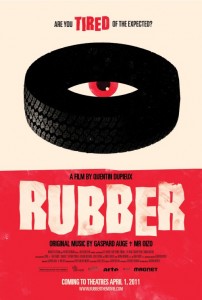 Rubber is going to be unfairly labeled as the “killer tire movie” and a lot of people are going to skip it because, well, let’s face it: a movie about a sentient tire with the ability make heads explode sounds pretty damn stupid, a 12-minute short at best or a quick joke stretched to a painful 90 minutes at worst.
Rubber is going to be unfairly labeled as the “killer tire movie” and a lot of people are going to skip it because, well, let’s face it: a movie about a sentient tire with the ability make heads explode sounds pretty damn stupid, a 12-minute short at best or a quick joke stretched to a painful 90 minutes at worst.
But Rubber is not stupid. In fact, Rubber may be one of the smartest films of the year, not a “killer tire movie” but a filmic deconstruction of story, an absurdist parody of not just horror movies, but all movies. Want a pull-quote? Here’s a pull-quote: Rubber is Roger Corman by way of Samuel Beckett.
The film hints at its total self-awareness from frame one, opening with a group of people standing in the desert, who receive a lecture from a police officer that may be one of the great comedic monologues I’ve seen in some time, explaining that events in films occur for no reason. They happen because they need to happen, because they need to advance the story. Although he gets key details of famous films very, very wrong, he has a point and it’s the point that Rubber so amazingly skewers.
There is no reason for a random tire to come to life and travel the country murdering everyone in his path. There is no explanation as to why or how, it just is. Because it has to. Because this is the movie and these are the events that must occur for the film to progress. Certain characters in the film are not only well-aware that they’re in a movie, they’re aware that they’re in a movie with a cheesy B-movie concept that’s hitting the standard beats and offering no surprises. It makes perfect sense that a few characters attempt to “end” the movie early by attempting to kill the audience so they can all go home.
Writer/director Quentin Dupieux (known worldwide as the musician Mr. Oizo) blends this intellectual, absurdist comedy with violent slapstick, including more than a few exploding heads. The film is immediately funny because of great actors saying very funny lines in very funny, very strange situations, but the true intellect behind what you’re watching, the real satire at the core of the movie, takes its time to fully reveal itself.
A scene where an “audience member” enters a scene to criticize how the characters are handling a threat is a great example; the banter between the characters is amusing by itself, but the idea of an audience member actually confronting the characters in a film and calling them on their poor decision-making is strange, unique and hilarious, particularly since the characters have little control over the actions of the story they’re stuck in and have to just play along with the situation they’re forced into. There’s a killer tire on the loose and they have to stop it.
I’m worried that describing Rubber as an artistic, intellectual comedy will drive people away from it, even more so than the “killer tire” moniker. However, this is an effortless watch, never tripping up on its ideas and never vanishing too far up its own ass. As complicated as some of the comedic ideas may be, the execution is as funny and entertaining as they come, capable of entertaining those looking for a silly, goofy B-movie riff as well as those looking for a deconstruction of the filmgoing and the filmmaking experience.
And, of course, there’s the tire itself, billed as Robert in the credits. Somehow, some way, Dupieux manages to wrangle an honest-to-God personality out of this inanimate object. It never talks, it just rolls, occasionally stopping to nudge an object or check out a beautiful woman as she showers. And here’s the impressive part: we always know what Robert the tire is thinking at all times. We know what he wants and we know how he feels. A great performance is rare enough. The fact that Dupieux extracts a great performance from a goddamm fucking tire is proof that he should be allowed to make a movie a year until he dies or quits. I’m in line for his next one right now.
9 out of 10